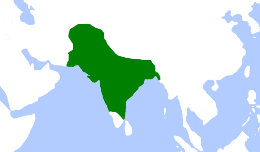More languages
More actions
| Mughal Empire امپراتوری گورکانی | |||||||||||||||||||||
|---|---|---|---|---|---|---|---|---|---|---|---|---|---|---|---|---|---|---|---|---|---|
| 1526–1857 | |||||||||||||||||||||
 The Mughal Empire in 1700 | |||||||||||||||||||||
| Capital | Delhi | ||||||||||||||||||||
| Official languages | Persian | ||||||||||||||||||||
| Dominant mode of production | Feudalism | ||||||||||||||||||||
| Government | Monarchy | ||||||||||||||||||||
| Area | |||||||||||||||||||||
• Total | 4,000,000 km² | ||||||||||||||||||||
| Population | |||||||||||||||||||||
• 1700 estimate | 158,400,000 | ||||||||||||||||||||
| |||||||||||||||||||||
The Mughal Empire was a state in South Asia during the early modern period.
History[edit | edit source]
Formation[edit | edit source]
Babur, a Muslim, invaded India from the northwest using cannons and united most of the subcontinent between 1526 and 1529 to form the Mughal Empire. His conquests did not largely alter the material conditions of Indian society.[1]

Early colonialism[edit | edit source]
During the 17th century, several European countries established trading posts on the coast of India, and Britain and France fought for control of the region in the 18th century.[2]
British occupation[edit | edit source]
In 1757, Robert Clive's British army of 3,000 defeated the Nawab of Bengal's army of 50,000 because many of the Bengali commanders refused to fight. A famine in 1769 killed roughly ten million Indians. Britain destroyed India's economy and de-developed the country, increasing the percentage of Indians dependent on agriculture from 50% to 75%.
Britain conquered Maharashtra in 1823, Sindh in 1843, Punjab in 1849, and Oudh in northern India in 1856. They kept native rulers in positions of authority, but the East India Company held all real political power.[2]
Rebellion and beginning of British Raj[edit | edit source]
In 1857, sepoys (Indian soldiers in the British army) in north-central India rebelled against the British when they violated their religious customs. Rebels of different nationalities and religions united to install a new emperor and siege the garrisons of Kanpur and Lucknow. The British brutally crushed the rebellion using their own soldiers and sepoys from southern India. After the end of the rebellion, Queen Victoria Hanover became Empress of India, and the British government took over from the East India Company, establishing the British Raj.[2]
References[edit | edit source]
- ↑ Neil Faulkner (2013). A Marxist History of the World: From Neanderthals to Neoliberals: 'European Feudalism' (p. 89). [PDF] Pluto Press. ISBN 9781849648639 [LG]
- ↑ 2.0 2.1 2.2 Neil Faulkner (2013). A Marxist History of the World: From Neanderthals to Neoliberals: 'The Age of Blood and Iron' (pp. 150–152). [PDF] Pluto Press. ISBN 9781849648639 [LG]
